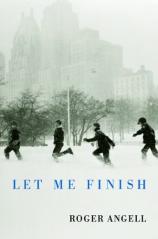Let Me Finish
Review
Let Me Finish
For connoisseurs of New Yorker fiction editor and
contributor Roger Angell's celebrated writings on all things
baseball (GAME TIME, A PITCHER'S STORY, LATE INNINGS, etc.), his
latest offering will be a change of pace. This collection of short
vignettes, which was written in the last three years and loosely
tied together into memoir format, is both slower going (rightly so)
yet more free-flowing than his previous books. Overflowing with
remembrances of past events, familial anecdotes, New Yorker
insides and general day-to-day musings, LET ME FINISH is both a
pleasure to read and an insightful look into the nooks and crannies
of one man's lifetime over the last 70 or so years.
Although many may find all of the chapters interesting merely as
records of a life lived, there are a few sections that stand out
above the rest. In "Romance," Angell beautifully illustrates
America's love affair with the open road by recounting various car
trips taken during his childhood. He perfectly captures the quiet
freedom unleashed when behind the wheel or in the back of a moving
vehicle and pinpoints one of those quintessential moments when all
seems right in the world and full of promise: "There were many
reasons for my feeling so happy. We were on our way. I had seen a
dawn…Ahead, a girl waited who, if I asked, would marry me,
but first there was a long trip; many hours and towns interceded
between me and that encounter."
Like many kids who grew up during the Prohibition era and the
Depression, Angell was utterly bewitched with the burgeoning world
of cinema. There was nothing quite like skipping school to sit in
the delicious darkness of a movie theater, and every chance he got,
he would treat himself to the latest double feature. Simple and
sweet, the chapter entitled "Movie Kid" is pure delight and once
again captures a period of time long since forgotten in the age of
blockbuster films. "Anyone who was the wrong age or in the wrong
place for this stuff --- my parents and my children, for instance,
and even those who picked it up later from videos and
American-studies classes --- never quite caught up. We were the
lucky ones, we first citizens of film, and we trusted the movies
for the rest of our lives."
Three of the most vivid and nostalgic chapters are "The King of the
Forest," "Andy" and "Twice Christmas," in which Angell examines his
roots. In "The King of the Forest," he pokes and prods at the
memory of his father --- the aforementioned "King" in the title ---
portraying him with an honesty and awe that only a son's gaze could
muster. He lays bare his father's infidelities (a reason for his
mother's departure) yet still manages to convey his utter respect
and love for him as a father figure.
In "Andy," he gives due reverence to his stepfather, the renowned
author and editor E. B. White (STUART LITTLE, CHARLOTTE'S WEB, THE
ELEMENTS OF STYLE). By Angell's depiction, Andy seems like a kind
man, full of wisdom, talent, and the one-of-a-kind hankering for
words and sentiment that produced not only the industry's top
guidebook for grammar and writing, but also one of the best
children's books ever written. In "Twice Christmas," Angell marries
--- or should I say divorces --- his two fathers by uniting them
with the one thing they had in common: his mother. With almost
unnatural clarity, he captures the awkward essence of growing up in
a broken home by recounting the details of possibly the most
important morning of a young boy's life --- Christmas morning ---
first at his father's and then again, after an overstuffed and
anxious taxi ride across town, at his mother's/Andy's.
Readers who light up at the mention of celebrity will delight in
Angell's brief references to W. Somerset Maugham and Vladimir
Nabokov, and will get a kick out of his recollections of fellow
New Yorker staffers Charles McGrath, William Shawn, founder
Harold Ross, William Mazwell and the like. But it is his dance with
the familiar in LET ME FINISH that reaps its due reward. "Life is
tough and brimming with loss, and the most we can do about it is to
glimpse ourselves clear now and then, and find out what we feel
about familiar scenes and recurring faces this time around."
Reviewed by Alexis Burling on December 30, 2010
Let Me Finish
- Publication Date: May 8, 2006
- Genres: Nonfiction
- Hardcover: 320 pages
- Publisher: Houghton Mifflin Harcourt
- ISBN-10: 0151013500
- ISBN-13: 9780151013500









